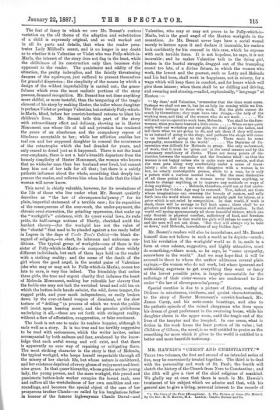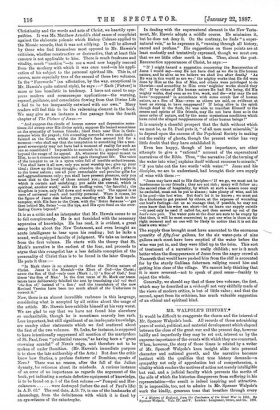MR. HAWEIS'S "CHRIST AND CHRISTIANITY."* THESE two volumes, the first
and second of an intended series of five, may be conveniently treated together. The third is to deal with the personality and work of St. Paul ; the fourth will sketch the history of the Church from Nero to Constantine; and the fifth will give a view of the chief religions of mankind. We gladly say at once that there is much in Mr. Haweis's treatment of his subject which we admire and that, with his general aim to give a living, personal interest to the records of
• 1. The Story of the Four iBrangelistal. 2. The Picture of Jesus ((he Mager). By the Be,. H. H. klaweis, ILA. London: Charles Barnet and Co.
"Christianity and the words and acts of Christ, we heartily sym- pathise. It was Mr. Matthew Arnold's chief cause of complaint against the elaborate polemic which Bishop Colenso applied to the Mosaic records, that it was not edifying. It will be allowed by those who find themselves most opposed to Mr. Haweis's criticism, whether constructive or destructive, that at least this censure is not applicable to him. There is much freshness and vitality, much "unction "—to use a word now happily rescued from the mockery with which it was once used—in his appli- cation of his subject to the personal spiritual life. This is, of course, more especially true of the second of these two volumes. In the " Forewords " (an affectation, by the way, exceptional in Mr. Haweis's quite natural style), he says :—" Each [Picture] is more or less homiletic in tendency. I have not cared to sup- press modern and sermonesque applications—the warning, reproof, guidance, and consolation flowing from that Divine Life I feel to be too inseparably entwined with our own." Many readers will feel this to be the redeeming element in the book. We may give as an instance a fine passage from the fourth
chapter of The Picture of ,Tesus:— " And suppose the clouds of human sorrow and depression some- times did sweep over His divine spirit; suppose He leaned sometimes on the sympathy of human friends; liked them near Him in Geth- semane when He prayed ; felt exceeding sorrowful even unto death ; fainted on the Cross, whilst the Father's face seemed hid for a moment—who shall say that the temptation to something like a tem- poral sovereignty may not have had a moment of reality for such an one so constituted ? Impossible to succumb to it ; granted—but not beyond the range of its appeal. Ah, whatever the appeal meant to Him, to us it comes home again and again throughout life. The voice of the tempter to us is a syren voice full of terrible seductiveness.
You shall have it all now, only you must worship me ; give up your ideal; throw up the long struggle ; abandon the high effort ; give in to the lower nature ; use all your remarkable and peculiar gifts for self-aggrandisement only; you shall have present pleasure, only you must sink to the level of those around you ; grasp the temporal, which is certain and satisfying ; put aside the eternal, which is spiritual, another word,' saith the scoffing voice, for fanciful ; the kingdom is yours, only fall down and worship me.' The appeal is at once of universal reach and terribly personal. When it comes, let the figure of Jesus rise before you, standing with His back to the tempter, with His face to the Cross, with the Retro Satanas '—' get thee behind Me, Satan '—on His lips, and His eyes fixed on the ever- lasting Crown beyond."
It is as a critic and an interpreter that Mr. Haweis seems to us to fail conspicuously. He is not furnished with the necessary apparatus of knowledge. He has read, it is evident, a great many books about the New Testament, and even brought an acute intelligence to bear upon his reading ; but he lacks a sound, well-equipped faculty of judgment. We take an instance from the first volume. He starts with the theory that St. Mark's narrative is the earliest of the four, and proceeds to argue that this evangelist has a less definite conception of the personality of Christ than is to be found in the later Gospels. He puts it thus :—
"In Mark there is no attempt to define the Divine nature of Christ. Jesus is the Messiah—the Elect of God—the Christ; never the Son of God—only once (Mark i., 1) 'a Son of God ;' four times the Son of Man.' In the first verse of St. Mark our trans- lators have deliberately falsified the text by translating 1.40i; Tal 0E011 the Son of,' instead of a Son ;' and the translators of the new Revised Version have been too much afraid of the Unitarians to correct it."
Now, there is an almost incredible rashness in this language, considering what is accepted by all critics about the usage of the article. Mr. Haweis here exhibits himself at his very worst.
We are glad to say that we have not found him elsewhere so uncharitable, though he is sometimes scarcely less rash.
Less important, but still significant of an inadequate knowledge, are sundry other statements which we find scattered about the first of the two volumes. St. Luke, for instance, is supposed to have intentionally suppressed all mention of the martyrdom of St. Paul, from "prudential reasons," as having been a "great crowning scandal" of Nero's reign, and therefore not to be spoken of under Domitian. (Mr. Haweis's immediate purpose is to show the late authorship of the Acts.) But does the critic know how Stating, a profuse flatterer of Domitian, speaks of Nero ? There was no reason, after the fall of the Julian dynasty, for reticence about its misdeeds. A curious instance
of an error of no importance as regards the argument of the book, yet indicating a certain defective equipment of knowledge, is to be found on p. 5 of the first volume :—" Pompeii and Her-
culaneum were destroyed (before the end of Paul's life) in A.D. 63." The real date, A.D. 79, is one of the landmarks of chronology, from the definiteness with which it is fixed by an eye-witness of the catastrophe. In dealing with the supernatural element in the New Testa- ment, Mr. Haweis adopts a middle course. He minimises it, but he does not deny it. On the contrary, he finds "a super- natural vein," as he expresses it, "running through all history, sacred and profane." His suggestions on these points are at least modestly and tentatively expressed, though we must own that we see little other merit in them. Thus, about the post- Resurrection appearances of Christ, he says :—
"If I might hazard a suggestion concerning the Resurrection of Jesus I would say—may He not have died as we die in His human nature, and be alive as we believe we shall live after death," As He was in this world so are we ;' the mighty works that He did were done by Him as the Son of Man, and others were privileged to do likewise—and according to Him even mightier works should they do.' If by virtue of His human nature He had His being, did His mighty works, died even as we live, work, and die—why may He not have ' reappeared ' in accordance with some occult law of human nature, as a Son of Man—even as others are said, on evidence at least as strong, to have reappeared ? If being alive in the spirit though dead in the flesh, He was able to manifest Himself to the senses and spirits of His friends, may He not have done so in the same order of nature, and by the same mysterious conditions which have ruled the alleged reappearances of other human beings ?"
It is scarcely a cheerful prospect that the faith without which we must be, as St. Paul puts it, "of all men most miserable," is to depend upon the success of the Psychical Society in making
out the reality of ghosts, though the present writer has very little doubt that they have established it.
Even less happy, though of less importance, are other attempts to give a "rational" account of the supernatural narratives of the Bible. Thus, "the narrative [of the turning of the water into wine] explains itself without recourse to miracle," "if you take out the two words 'with water.'" Jesus and his disciples, we are to understand, had brought their own supply of wine with them :-
"Jesus may have said to His disciples= If we go, we must not be burdensome to our friends ; they are not rich; many will follow us ; the sacred rites of hospitality, by which at such a season none may be excluded, must not be pat to shame ; take plenty of wine, and let it be good—the best wine. But don't let it be known ; we must not do a kindness to get praised by others, at the expense of wounding our host's feelings—let us so manage that, if possible, he may not even know that his wine ran short—let us leave our supply outside —it need only be used if called for, and then served up out of the host's own pots. The water pots at the door are sure to be empty by that time, it will be most convenient to put our wine in them at the right moment and no one will be likely to notice that it is not the host's own wine."
The supply thus brought must have amounted to the enormous
quantity of fiftylour gallons, for the six water-pots of nine gallons each must have been emptied of the water before the
wine was put in, and they were filled up to the brim. This sort of treatment of a narrative is really childish ; nor is it much better when the disappearance of Jesus from the angry crowd at Nazareth that would have pushed him from the cliff is accounted for by the sturdy Galilean fishermen rallying round him and getting him clear of the village. We cannot help thinking that it is more reverent—not to speak of good sense—frankly to reject the whole.
Generally, we should say that of these two volumes, the first, which may be described as a r1Thaujjr6 not very skilfully made of the views of modern critics, is but of little value ; and that the
second, apart from its criticism, has much valuable suggestion of an ethical and spiritual kind.



































 Previous page
Previous page